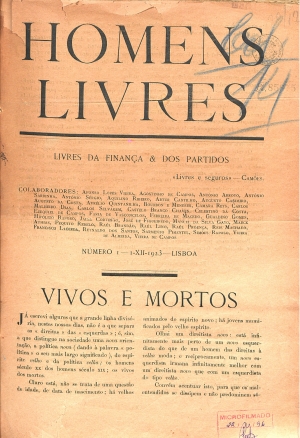
António Sérgio was the main editor and director of this publication. Printed in the same typography as Orpheu (Tipografia do Comércio), it had little longevity, having only lasted two issues at the end of 1923. Its subtitle is explanatory, also of its little longevity: "[Men] free from finance and parties" , which demonstrates the doctrinal nature of the publication, as it follows the campaign launched by the magazine Seara Nova, months before, for the “national reorganization” towards an impartial government. Thus, most of its collaborators come from that publication (Jaime Cortesão, Raul Proença, etc).
João Medina says, in his well-known study of this magazine, which is also a facsimile of the two issues: “The constitution, in 1923, of the Homem Livres group, bringing together monarchists from Lusitanian Integralism and republicans from Seara Nova, constitutes one of the greatest surprises of the ideological and political intricacies of the First Republic. Opposite in everything, the integralists faithful to neo-Miguelism and the sowers of a socializing nature, however, had a common dominator: the identical rejection of the institutional status quo, the repudiation of demo-liberalism, the refusal of a regime of riot, 'plutocracy' and government inefficiency” (João Medina, O Pelicano e a Seara. Integralistas e Seareiros juntos na Revista Homens Livres, Lisboa, Edições António Ramos, 1978).
The ephemeral magazine is really a junction of two opposing factions that this ephemerality is indeed a sign. The alleged freedom of these free men ("free and secure", according to the Camões’ epigraph of the second number) is almost inefficient and would result in failure. Its freedom begins in meetings held within the National Library throughout that year (both issues came out in early December), with personalities coming from the so-called "National Library Group", already mentioned, but also from old collaborators of A Águia and Portuguese Integralism (António Sardinha, Castelo Branco Chaves). Chronologically, we must place the magazine halfway between the bloody night of October 1921 - which would thus frighten elites from different quarters - and the 1926 coup, which would forever change the political face of the country.
In an austere-looking magazine, without advertising, the literary part of this magazine is very dry. On the first issue, some words quoted by Antero, in both numbers (the great moral reference for free men of this period) and by Almeida Garrett (a brief quote); on the second, the same in relation to the artistic part, with few caricatures copied from newspapers, and a timid "Artistic Section" in the second issue, with the winter program "pro-art" of the Associação de Artistas Portugueses.
Ricardo Marques
